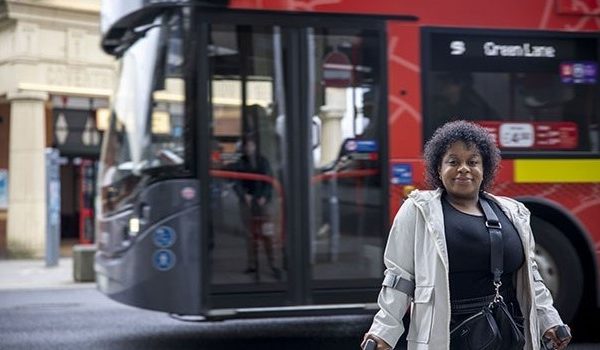What the programme about?
Scaling Innovation is a programme that provides funding to innovators to test and develop solutions to remove barriers to transport for disabled people in line with set challenges identified by robust evidence.

What it seeks to do?
Provide funding challenges that are shaped by evidence from ncat research, conversations with experts, and alignment with other funders like Motability Foundation, DfT, and UKRI.
Ensure that every funded project demonstrates authentic co-creation, ensuring solutions are grounded in lived experience and genuine collaboration.
How it seeks to do it?
The ncat Scaling Innovation Programme offers any organisation, individual, or entrepreneur the chance to tackle evidence-based challenges.
The 2025/26 programme runs in three phases.
- An initial planning phase where up to 20 projects will each receive £10,000 to plan their delivery and meaningful involvement with disabled people.
- A delivery phase where 12-15 projects evaluated and selected based on out puts from the planning phase will secure between £50,000 and £150,000 to deliver live trials. Phase two the funding is dependent on your solutions maturity level.
- The third and final phase offers a further funding opportunity of £100 – £150k for 8-10 Pre-demonstrator and trail projects that progress from phase 2.
Delivery is supported with business and technical support and expertise from within the ncat consortium.
The focus and challenges for future calls built on findings from the previous projects, and further ncat research outcomes.
The call for applications is now closed.
What we’ve done so far?
The First funding round 2024/25
In October 2024, we launched the first funding programme, and provided a webinar video on YouTube which gave guidance for any prospective applicants. Applications closed in December 2024 and the first projects were awarded in March 2025.
Projects responded to one of two challenges, or the ‘open call’:
- Physical Barriers in the Street: Developing solutions to overcome obstacles that disabled people encounter in the street environment.
- Interactions with Other People: Improving interactions between transport staff, the public, and disabled people.
- Open Call: Inviting ideas that enhance transport accessibility for disabled people beyond the specified challenges.
The first set of projects
Projects were selected based on their potential to address these challenges and their scalability, with an emphasis on making a significant impact and extending beyond the initial scope. Additionally, projects that demonstrated meaningful involvement with disabled people and a deep understanding of end-user needs were prioritised.
Types of Supported Projects:
- Proof of Concept
- Pre-Demonstrator
- Trial Projects
This approach enables ncat to support new products at all stages of the product development lifecycle, identifying and removing barriers to the adoption of new technologies and delivering new products directly to users.
The programme is delivered by ncat consortium partner Connected Places Catapult, ensuring that our programme participants receive tailored business and growth support, peer-to-peer learning, networking, and showcase opportunities.
Selected Projects are:
- BRISTOL BRAILLE TECHNOLOGY CIC: Bristol Braille Technology is developing tactile maps of British public transport using uniquely British-made Canute Console Braille displays, enabling blind people to better navigate and understand the transport network.
- BRUNEL UNIVERSITY LONDON: Brunel University London has developed a proof-of-concept intelligent vehicle that integrates head movement control, eye tracking, Bluetooth connectivity, and ultrasonic obstacle avoidance to enhance accessibility, autonomy, and safety for users with mobility impairments—paving the way for future smart wheelchair applications.
- LIVING OPTIONS DEVON: Living Options is developing an accredited Disability Awareness Training module for bus drivers to improve interactions with disabled passengers.
- OSTRUM TECH LIMITED: Ostrum Tech Limited’s trial aims to help airports and airlines better understand the challenges faced by disabled people, enhance their confidence in disability awareness, and improve support for disabled travellers.
- OXFORD BROOKES UNIVERSITY: The School of Engineering at Oxford Brookes University is developing an economical and lightweight power add-on device for manual wheelchairs. It is compact and modular, enabling use in constrained spaces and eliminating range anxiety, empowering users and giving them autonomy
- PODARIS LIMITED: Podaris is developing A+PTAL (Accessible Public Transport Access Level), an advanced accessibility metric that helps transport planners and authorities better understand, measure, and improve network accessibility for disabled people through detailed scoring instead of binary assessments.
- REACT ACCESSIBILITY LIMITED: React Accessibility is developing an ‘at-the-bus-stop’ bus request feature, enabling blind and visually impaired passengers to automatically request their bus to stop, making boarding and onward travel easier.
- SUPERSMITH LIMITED: Supersmith has developed the 3Scooter to address challenges faced by disabled people in accessing shared micromobility schemes, including issues with incompatible street environments and vehicles. Its design aims to increase accessibility for a wider range of users.
- THE DISABILITY POLICY CENTRE LIMITED: The Disability Policy Centre has created a Street Transformation Execution Plan to address barriers to street access for disabled people. Their research will define these barriers to develop a national policy blueprint for accessible streets.
- TRANSPORT FOR ALL: Using insights from disabled research participants, Transport for All and Ross Atkin Associates are developing a nationally applicable digital tool that helps design accessible streets by identifying the impact of street features on the diverse needs of disabled people.
- VIRTUAL TOUR EXPERTS: Virtual Tour Experts is developing an interactive virtual tour platform, supported by British Sign Language, to help deaf and disabled people confidently navigate Exmouth’s transport hubs and public spaces. The platform offers accessible pre-journey planning and intuitive wayfinding tools.
- XRAI LIMITED: XRAI has developed an AI speech app that transcribes and translates in 140 languages. The new ‘XRAI Rugged’ appliance will help passengers access announcements and staff communications in their preferred language, improving accessibility for all.
As individual projects commence we will be sharing more detailed projects plans and updates on these project pages.